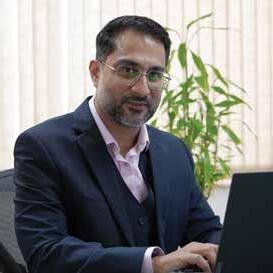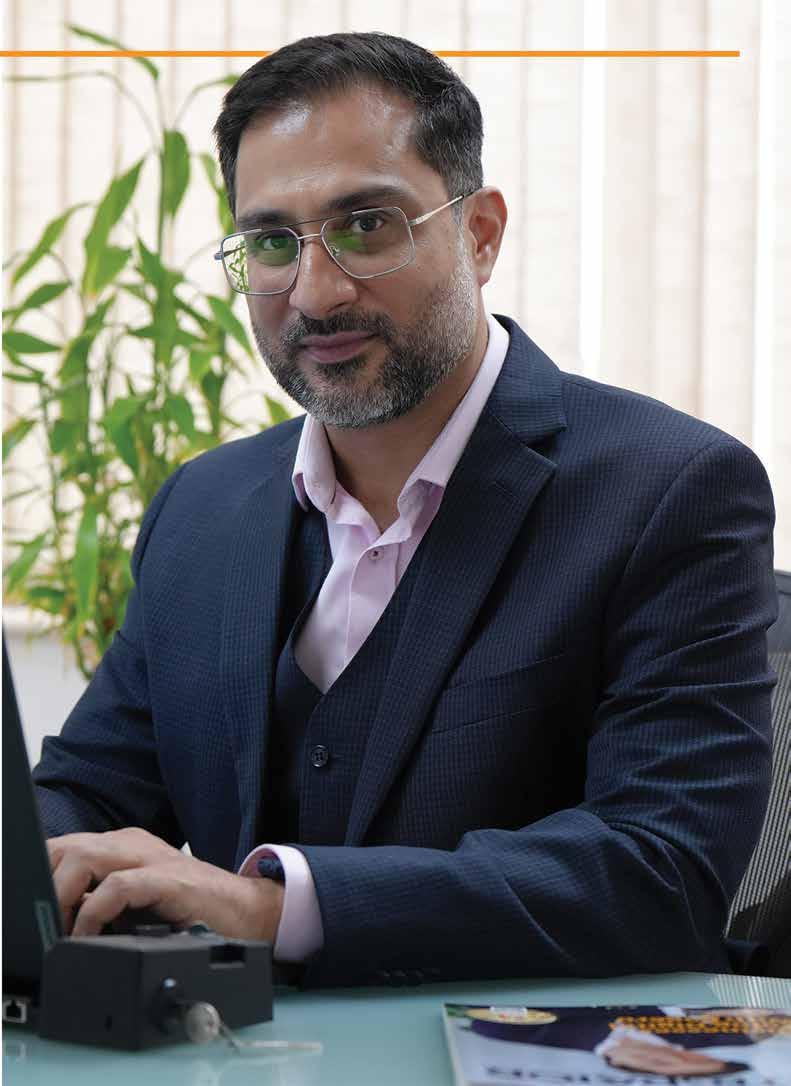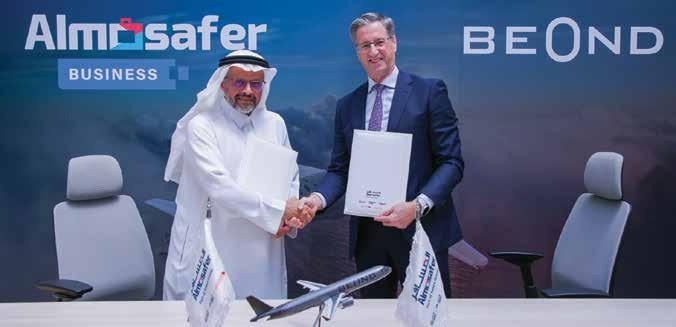






















































In an ever-evolving world, the future isn't waiting—it's being actively shaped by brilliant minds, innovative companies, and forwardthinking policies. This September issue of Technology Integrator is where we embark on a thrilling journey through the most promising Future Tech Trends.
Our world is on the cusp of incredible transformation. From artificial intelligence that understands our emotions to sustainable technology solutions that can power entire cities, the future we once dreamed of is now materializing. And in this issue, we're putting the spotlight on the collective efforts of companies, individuals, and policy makers who are pioneering this new frontier.
Within these pages, you'll find exclusive interviews with visionary leaders who are driving innovation in ways we could only imagine. Dive into insightful articles encompassing the evolution of technology, success strategies in the business realm, AI's influence on hospitality, data analytics for carbon footprint reduction, the intersection of physical and cyber security, a transformation of age-old real estate practices, advancements in construction technology, the vision of future cities, and much more. Our spotlights on cutting-edge companies will showcase their groundbreaking technologies and the impact they're poised to make on our lives.
We're dedicating this issue to the cause of Future Tech Trends, celebrating the boundless possibilities that await us. From AI to healthcare, from hospitality to transportation, the innovations featured here will reshape the way we live, work, and connect with one another.
So, whether you're a tech enthusiast, a business leader, or simply curious about what the future holds, “Technology Integrator” is your roadmap for navigating tomorrow. Join us as we explore the horizons of possibility and witness the unfolding of a future that promises to be beyond our wildest dreams.

And now, as you stand at the threshold of this incredible journey, ask yourself: "What role will I play in shaping the future?" The answer lies within these pages. The future is here, and it's waiting for you to discover.
Vivek Sharma FounderVivek Sharma Founder

Adil Siddiqui
Head of Media
Srijith K N Assistant Editor
Faiz Ahmed Graphic Designer
Priyanshu Ranjan
Sales Head
Sakshi Sindwani
Sr. Media Sales Manager


Gladwyn Pereira
Sr. Media Sales Executive
Zain Fazal Sankay
Media Sales Executive
Arbaaz Khan

Media Sales Executive

Sidra Kamal Content Contributor
Roshni Menon Content Writer

Suneeta Dadwani Business Coordinator
Published by:
JNS Media International (OMA Group Company)
OMA House, P.O. Box: 3314, Sharjah, UAE. Tel: +971 6 573 0000 | www.VARonline.com



For All Inquiries: jns@omaemirates.com
Mobile: +971 56 404 0503

Disclaimer:









In a world hurtling at warp speed into the realms of technology, we're on the cusp of a future where seismic trends are poised to reshape the very fabric of industries and societies. Picture the stage: a symphony of Artificial Intelligence (AI), Blockchain, and Quantum Computing, harmonizing in a dance of innovation that's nothing short of breathtaking. The convergence of the three heralds a new era where possibilities are boundless.

Gone are the days of AI being just a trendy buzzword. It's evolved into an indispensable asset, seamlessly entwined with business integration. Imagine an orchestra conductor that processes mammoth data, extracts actionable insights, and orchestrates real-time decisions – that's AI in the business realm. From optimizing supply chains to nurturing customer relationships, AI-powered integration solutions are penning a new chapter in operational brilliance.
This AI evolution is a spellbinding narrative, transcending mere automation. It's evolved from rulebound systems to deep learning, the bedrock of modern AI. Now, enter Quantum Computing, the next realm to conquer. It's the secret sauce that could thrust AI into uncharted dimensions of power. The mind-bending beauty? They're like a dynamic duo in a superhero saga, each enhancing the other's strengths. But here's the twist: AI's journey is beset with ethical crossroads, demanding responsible navigation.
Ever heard of the National Artificial Intelligence Strategy 2031? The UAE has launched this stellar ship, aiming to be the global AI maestro by 2031. This visionary move is projected to inject a staggering $320 billion into the economy, an 11% GDP boost that'll make heads spin. Not to be outdone, Saudi Arabia is on its own quantum expedition. By 2030, AI's slated to contribute 12.4% to its GDP. Brace yourselves – these ambitions aren't just aspirations, they're
economic thunderbolts.
Here's where the magic unfolds. AI-powered systems gracefully stitch data from all corners, no matter the format or location. It's like a cosmic quilt, gifting organizations panoramic insights from both structured and unstructured data. Hidden patterns, trends, and anomalies? AI's got that sorted – stuff that might've eluded human eyes. The result? Enhanced forecasting, risk management, and a game-changing renaissance of informed decision-making.
Now, zoom into the world of complex global supply chains. AI-driven integration transforms them into a realtime ballet of inventory, demand, and production levels. Those predictive analytics? They're like fortune-tellers, helping businesses foresee disruptions, master inventory management, and
QUANTUM COMPUTING, IS THE SECRET SAUCE THAT COULD THRUST AI INTO UNCHARTED DIMENSIONS OF POWER.
dissolve supply chain bottlenecks. In this ever-shifting landscape, the fusion of AI and integration isn't a luxury – it's survival armor in the digital era.
Let's flip the script to Quantum Computing, where computational rules are shattered like glass. Qubits, superposition, entanglement – these are the game-changers. Imagine a realm where quantum supremacy reigns supreme, opening doors to uncharted territories in cryptography, optimization, and scientific simulations.
The potential applications of quantum computing span a wide array of fields, from cryptography to optimization and scientific simulations. Cryptography, a cornerstone of modern digital communication, faces a paradigm shift with the advent of quantum computing. In optimization, quantum computers hold the promise of revolutionizing supply chain management, financial portfolio optimization, and even drug discovery. Their ability to explore a multitude of possibilities simultaneously can drastically reduce the time and resources required to find optimal solutions in highly complex scenarios.
Quantum computing represents
a paradigm shift in the world of computation. Its principles of qubits, superposition, and entanglement challenge traditional notions of computational power, opening up new possibilities across diverse industries. The UAE and KSA, with their proactive approach to technological innovation, are well-positioned to leverage quantum computing's potential for the betterment of their societies and economies. As quantum computing continues to evolve, its transformative impact is set to redefine the boundaries of what is computationally possible.
Now, say hello to the revolutionary marvel known as Blockchain. Small and medium businesses (SMEs) are eyeing it like treasure hunters. The lure? A chance to reshape business models via blockchain and smart contracts. The Saudi Central Bank's musing about a Central Bank Digital Currency (CBDC)? That's just one note in the blockchain symphony. The UAE, with its Emirates Blockchain Strategy 2021, is soaring at the vanguard of blockchain adoption.

Behold the dawn of a new era! AI, Blockchain, Quantum Computing – they're not just trends, they're trailblazers remapping industries, economies, and our digital existence. According to Gartner, around 75% of AI-powered businesses will launch a surge in streaming data and analytics infrastructure. These trends? They're not just interwoven; they're inseparable lovers on this digital dance floor.
And as we stand on this cusp of change, a rallying cry echoes: innovation must clasp hands with responsibility. AI's growth must be tethered by ethics, technological leaps must be grounded in sustainability, connectivity must stand fortified by security, and blockchain? It must pave the road for an equitable digital evolution. Navigating this uncharted terrain? It's about embracing change, pirouetting with agility, and nurturing a lifelong affair with learning. This is the anthem of a society poised to flourish amidst the tech storm.
NAVIGATING THIS UNCHARTED TERRAIN? IT'S ABOUT EMBRACING CHANGE, PIROUETTING WITH AGILITY, AND NURTURING A LIFELONG AFFAIR WITH LEARNING.





















2023 after COVID: a time where people have become more health conscious and the hoteliers have to shift their ideas upside down to fulfill their needs. With health-consciousness on the rise, individuals are no longer content with merely knowing the ingredients and quantities in their meals; they now seek a deeper connection with their food. The quest for freshness and transparency in food preparation has spurred a technological revolution in the hospitality sector, ushering in the era of UV-based food preservation.
At the heart of this transformation lies the science of ultraviolet (UV) radiation, which offers a promising solution for food preservation. Nonthermal processing methods have long been explored by scientists, and UV irradiation has emerged as a frontrunner in this pursuit. It not only reduces pathogens but also minimizes nutritional losses, addressing two critical aspects of food safety and quality.
Ultraviolet radiation spans various categories based on wavelength,
By: Sidra Kamal, Content Contributorincluding UV-A, UV-B, UV-C, and vacuum-UV. Among these, UV-C stands out for its remarkable antimicrobial effectiveness. Its wavelength, around 260–265 nm, corresponds to maximal UV absorption by the genetic material (DNA or RNA) of microbes. UV-C damages or modifies the DNA of bacteria, impeding their ability to reproduce and thrive.
In the hospitality sector, where the fusion of ambience and exquisite food is paramount, guests now seek culinary experiences that transcend traditional notions of quality and quantity. They crave food that embodies freshness and safety, setting new standards for excellence.
UV light food sterilization, often referred to as irradiation, is a revolutionary process that, contrary to its name, does not render food radioactive in any way. It is an entirely safe method for sterilizing food

using UV lamps designed to emit wavelengths in the UVC range.
According to reports by the World Health Organization, UV food radiation is a secure process that eliminates bacteria and extends the shelf life of products, ensuring food remains safe and healthy.
Quick: UV energy, when emitted at the right nanometer (typically 254 nm) for the correct exposure time (usually measured in seconds), swiftly preserves food and eradicates bacteria and viruses.
Eco-friendly: UV light offers a sustainable solution, eliminating the need for chemicals and producing no toxic byproducts during the sterilization process.
Easy to maintain: UV systems are not only effective but also easy to maintain. They often contain high-efficiency ballasts for energy efficiency, and quality bulbs ensure longer-lasting performance, reducing maintenance costs.
Cost-effective: Food irradiation using UV lamps proves to be economical in the long run. Proprietary technologies, such as LightSources' LongLife+, extend lamp lifespans and enhance performance, offering cost-effective and efficient solutions.
In 2023, the collaboration of hospitality and UV-based food preservation represents a new pinnacle of innovation in the food industry. As consumers demand fresher, safer, and more transparent food experiences, UV technology emerges as a beacon of hope, ensuring that the future of food remains as radiant as the UV light itself – quick, eco-friendly, easy to maintain, and cost-effective. The hospitality sector's journey towards perfection has found its companion in UV-based FoodTech, setting a new standard for the industry's evolution.
Have you ever imagined a world where your every desire is anticipated and catered to by an entity that seems to possess an uncanny ability to understand your preferences, whims, and even your unspoken wishes?
A world where the realm of luxury merges seamlessly with the realm of technology, giving birth to a new era of hospitality that seems straight out of a science fiction novel?
Buckle up: here’s a journey into the future of hospitality where AI butlers and robo-chefs rule supreme, turning our vacation fantasies into a captivating reality.

Artificial intelligence has emerged as a brilliant star in the grand tapestry of technological advancement, and the hospitality industry is no exception. Picture this: AI-powered concierges that not only remember your name but also recall your favorite breakfast cereal. Robots that can seamlessly converse in multiple languages, ensuring that you feel at home regardless of your origin. The capabilities of AI in the hospitality sector are just starting to surface, and what we have witnessed so far is merely the tip of the iceberg.
According to a recent report from Accenture, the global AI market could potentially double annual economic growth rates by 2035. The AI revolution in hospitality isn't confined to just administrative tasks or language translation; it extends to understanding guest behavior, personalizing experiences, and even predicting needs.
Despite all this encouraging progress, there are also negative aspects of AI's impact on the economy, especially when it comes to job displacement. A report by the Organization for Economic Cooperation and Development (OECD) indicates that approximately 14%
of jobs in 21 countries face a high risk of automation. Furthermore, a study conducted by the McKinsey Global Institute forecasts that automation could potentially displace as many as 800 million jobs by the year 2030. Nevertheless, it's worth highlighting that these reports also emphasize the potential for AI to generate new job opportunities.
It's important to understand that this is a two-sided coin. In this case, Hoteliers who grasp the potential of AI tools to enhance their efficiency and effectiveness will see their value soar. Conversely, those who neglect to educate themselves may encounter greater challenges.
Close your eyes and imagine stepping into a luxurious hotel at the heart of Dubai, where opulence and technology entwine seamlessly. As you walk through the grand entrance, you are greeted not by a human concierge, but by an AI butler named Artificially Intelligent Virtual Assistant. It is no ordinary assistant; it has been trained on vast amounts of data to not only recognize your face but also predict your preferences with remarkable accuracy. The sensor-laden corridors ensure that the ambient lighting adjusts according to your mood, and the room's temperature adapts to your preference before you even step inside. This level of personalization is made possible by AI's ability to comprehend your behavioral patterns, creating a truly tailored experience that surpasses all expectations.
At the heart of this luxurious oasis, the gastronomic experience is curated by a team of culinary experts led by none other than 'ChefBot.' This robo-chef is no ordinary kitchen appliance; it is a marvel of AI engineering, capable of crafting exquisite dishes that combine flavors in ways you could never have imagined. Equipped with an extensive database of recipes from around the world and the ability to analyze guest preferences, ChefBot doesn't just cook; it orchestrates a symphony of taste, aroma, and presentation that leaves you awe-inspired.

In AI-powered hospitality, the UAE stands as a pioneer, embracing innovation and pushing the boundaries of what is possible. With data as the fuel, AI as the engine, and imagination as the compass, the possibilities are endless. Our vacation fantasies, once confined to the pages of literature, are now within reach, reshaping the way we define luxury and experience.
As the sun sets over the shimmering skyline of Dubai, we leave behind the world of Hospitality 1.0 and step into a world that is bound only by the limits of our imagination. AI butlers that understand us better than we understand ourselves, robo-chefs that redefine the culinary landscape, and a hospitality experience that bridges the gap between reality and dreams – this is the horizon of Hospitality 2.0.

According to the UAE Government, “The UAE Net Zero by 2050 strategic initiative is a national drive to achieve net-zero emissions by 2050, making the Emirates the first Middle East and North Africa (MENA) nation to do so.” In a world where environmental concerns and sustainability have taken center stage, the imperative to mitigate climate change has become more imperative. Organizations across various industries are realizing their responsibility to assess and minimize their carbon footprint, contributing to a greener and more sustainable future.
In this transformative journey, data analytics emerges as a powerful ally, offering insights that transcend traditional methods and empower organizations to make informed decisions, optimize operations and drive real change.
By: Jadd Elliot Dib Founder and CEO, Pangaea X
"THE UAE NET ZERO BY 2050 STRATEGIC INITIATIVE IS A NATIONAL DRIVE TO ACHIEVE NETZERO EMISSIONS BY 2050."
The realms of data analytics lie at the heart of the transformative journey of business. Every interaction and transaction generate invaluable data, and the potential to harness this resource is limitless. In the dynamic landscape of the Future of Tech, data analytics stands as the cornerstone of innovation. By converging data analytics with sectors like Information and Communication Technology (ICT) and finance, we extract transformative insights that steer smarter decisions and drive growth. This synergy empowers businesses to not only adapt, but to excel, propelling them towards a future where data is the ultimate asset.
inefficiencies, wasteful practices, and opportunities for optimization. Armed with this information, organizations can strategically direct their efforts towards the most impactful initiatives, creating a roadmap for sustainable transformation.
The true power of data analytics lies in its ability to guide organizations towards actionable strategies for carbon footprint reduction. Data-driven insights facilitate evidence-based decisionmaking, allowing organizations to identify low-hanging fruits as well as long-term, systemic changes. Whether it's adopting energy-efficient technologies, optimizing transportation routes, or enhancing resource management, data analytics enables organizations to select interventions with the highest potential to reduce emissions.
As organizations implement sustainable practices and initiate changes, data analytics continues to play an important role by providing ongoing measurement and monitoring. Regular data analysis allows organizations to track the effectiveness of their initiatives and make necessary adjustments.
Measuring an organization's carbon footprint involves quantifying the total greenhouse gas emissions generated across its operations, from production to distribution. Yet, this seemingly daunting task is made more manageable through data analytics. By aggregating vast datasets from various sources, including energy consumption, transportation, supply chains, and more, organizations can gain a comprehensive understanding of their environmental impact. This datadriven approach provides a holistic view that enables accurate measurement and identification of emission hotspots.
Data analytics not only reveals the magnitude of an organization's carbon footprint but also pinpoints specific areas where improvements can be made. By analyzing the data, patterns and trends emerge, offering insights into

The role of data analytics in carbon footprint reduction extends beyond individual organizations—it's a collective endeavor with far-reaching implications. By aggregating data from multiple sources, industries and regions, insights can inform broader policy decisions and collaborative initiatives to combat climate change on a global scale.
In the journey to combat climate change, data analytics is more than just a tool; it's a catalyst for transformation. It empowers organizations to gauge their influence, optimize their operations and embrace sustainability as a core principle.
As we strive for a more sustainable future, the integration of data analytics into carbon footprint reduction strategies will undoubtedly be a defining factor in the success of these efforts. Through innovation, collaboration, and datafocused decision-making, we can build a world which thrives whilst respecting the planet's precious resources.
systems and cyber defenses as this will help to give an idea of current posture and quality of infrastructure.
Creating a formal relationship between cybersecurity and the governance of data will also be extremely beneficial. This essentially creates an agreed approach to cybersecurity between all parties within a smart city, meaning all stakeholders work together to ensure data is secure across the networks it's being exchanged. The policies put in place will mature alongside a city's cyber strategy and add transparency to processes.
By Muhammad Yahya Patel Lead Security Engineer, Check Point Software Technologies
Research suggests that by 2024 there will be over 1.3 billion wide-area network smart city connections. The level of complexity within these digital infrastructures is only increasing which means any digital services implemented by a government or organization are vulnerable to cyberattacks. To realize their potential, smart cities need to find an effective balance between managing risk and enabling growth.
Building resilience to protect your city against these attacks is key, but how is this achieved? The starting point should be developing a cybersecurity strategy that maps on to the broader objective of your smart city. This will help mitigate risks arising from the interconnectedness of city processes and systems. Part of any effective strategy should be the requirement to carry out an assessment of current data,
Finally, building strategic partnerships to help address the cybersecurity skills shortage is key to any successful security strategy. This is a good way to develop skills and increase your knowledge base which in turn bolsters overall security posture and resilience. For example, recently the CISA, NSA, FBI, NCSC-UK, ACSC, CCCS and NCSC-NZ released a document with guidance on best practices for smart cities. The aim is not only to protect these connected spaces from malicious threats but also to share expertise and educate us on the importance of cybersecurity within smart cities.
Risk, privacy and legality all play an important role in smart cities, making sure data being collected, stored and processed is in accordance with regulations. It’s critical that city leaders, developers and business owners don’t see securing cyber risk within their smart city as a one-time objective. It’s an ongoing, evolving process that could be the difference between a major breach or major growth.


Amidst evolving technology, ERP solutions are entering a transformative phase, driven by advancing AI integration. This rapid change has called the Integrator to interview with Mr. Vibhu Kapoor, Regional VP for the Middle East, Africa, and India, Epicor. In this role, he leads the expansion of Epicor business across the region. Exploring AI integration and cloudnative evolution, we delve into ERP solutions and Epicor innovations in this segment, and their major successes.

How is the role of ERP evolving, and what are the key changes that businesses should be mindful of when considering the adoption of ERP solutions for their operations?
Enterprise Resource Planning (ERP) stands on the cusp of another evolutionary phase today. Over the past 50 years, this technology has transformed to reach its present state. Yet, further transformation is underway, characterized by the integration of AI directly within the ERP framework. While ERP solutions are already accessible through the cloud, there is a deeper push towards full cloud-native integration. Moreover, ERP's evolution aligns with the datacentric nature of today's global economies. It must effectively harness the data existing within an organization. It is this progression that is defining the trajectory of ERP technology.
Turning to the crucial question you raised about what organizations should prioritize when adopting ERP, the initial step is to comprehend the purpose behind seeking an ERP solution. Viewing ERP as more than a mere remedy for specific current business challenges is imperative. Instead, it should be regarded as a strategic asset that contributes to long-term objectives, and extending value beyond immediate challenges. A holistic approach considers digital strategy alignment and recognizes the importance of ERP as a foundational element. While scalability and cloud integration matter, the focus is on complete cloud-native integration, spanning databases to analytics. Industry alignment is crucial, ensuring ERP accommodates specific functionalities and business needs, for informed decisions and operational success.
How does Epicor distinguish itself from competitors? Furthermore, could you elaborate on how your solutions contribute to enhancing transparency of operations and supply chain?
In the competitive landscape, Epicor sets itself apart through a combination of unique attributes. Each player in the market possesses its own strengths and specialties. We at Epicor, with our flagship ERP solution, Epicor Kinetic, have etched a distinct niche by catering to enterprises, particularly in the manufacturing sector, while concurrently emerging as a preferred cloud vendor. This strategic positioning enables us to be the top-of-mind choice for businesses seeking cloudbased solutions. This positioning has become a hallmark of our identity.
Another pivotal factor distinguishing us is our proactive approach to challenges. Recently, we launched our Data Center offering, hosted on Microsoft Azure, in the UAE. This initiative underscores our commitment to regional customers by addressing concerns such as latency, data governance, and sovereignty issues. By preemptively establishing a locally delivered cloud solution, we mitigate potential hurdles, showcasing our forward-looking approach and dedication to customer-centric solutions. This initiative reinforces our competitive advantage and sets us apart.
Epicor bridges the gap between SMEs and large enterprises, offering unparalleled adaptability and scalability. Our solutions serve diverse clients, from mid-market to
multi-billion-dollar conglomerates, seamlessly transitioning across scales. Moreover, our industry-specific focus, especially in manufacturing, is powered by Epicor Kinetic, addressing unique needs with a modular approach and industry expertise.
In summary, Epicor stands out from the competition by three defining factors. Our cloud-first approach, complemented by industry specialization, and the capability to cater to businesses of varying scales, positions us favorably in the market. By consistently meeting the dynamic demands of SMEs, facilitating smooth transitions to enterprise-level operations, and honing in on industry-specific requirements, we offer a comprehensive value proposition that distinctly sets us apart from the competition.
Could you please explain the significance of EPICOR solutions beyond the core ERP, such as content management and data analysis? How do these offerings bring value to businesses?
When we discuss ERP, the focus often remains on the comprehensive suite of functions it encompasses, including finance, inventory, supply chain, HR, CRM, and more. However, Epicor goes a step further by offering specialized solutions beyond the traditional ERP framework. Let's delve into a few of these offerings and understand the benefits they deliver.
First consider Epicor Enterprise Content Management (ECM). This product is a game-changer in document management practices. It leverages intelligent data capture and machine learning, incorporating substantial AI elements. ECM automates processes like invoice handling through welldefined workflows. The result? Enhanced accuracy, reduced processing time, and heightened productivity. Businesses of varying sizes find value in this solution, making it a popular choice.
Another notable offering tailored particularly for the manufacturing sector is the Epicor Advanced Manufacturing Execution System (MES). Operating within the framework of industry 4.0, this powerful solution optimizes manufacturing processes. It achieves this by providing real-time visibility, control, and insights into production operations. The outcome is heightened efficiency, cost reduction, and overall productivity enhancement. MES not only monitors production in real time but also efficiently manages shop floor resources, leading to significant efficiency gains.
Importantly, this solution empowers decision-making from the shop floor to the top floor. While traditional ERPs often focus on top and mid-level management, MES extends its reach to data generated by production machinery itself. This capability provides a holistic view of operations and informs better decision-making at all levels.
Moving forward, Epicor CPQ (Configure, Price, Quote) emerges as a critical solution in our portfolio. CPQ simplifies and automates processes across three key departments: sales, engineering, and manufacturing. It offers dynamic 2D and 3D product configuration through visualization tools. These tools empower sales teams, distributors, and even
website visitors to understand complex product offerings in a visually comprehensible manner. This is especially useful for industries like retail and construction, where customized solutions are integral.
Lastly, Epicor Financial Planning and Analysis (EFP&A) is another of our standout products, offering budgeting, planning, forecasting, reporting, and consolidation atop the ERP in a user-friendly platform. With a modular approach, it enables building on existing ERP foundations, introducing solutions like ECM, Advanced MES, or CPQ as required. Even non-Epicor ERP businesses can adopt and integrate these solutions. The extended offerings from Epicor transcend traditional ERP capabilities, enhancing operational efficiency by addressing specific business needs.
management, accessibility, and security while reducing costs.
Can you provide some examples of recent business successes through your engagement with your channel partners?
The Epicor partner ecosystem is a crucial facet of our operational ecosystem. Our qualified partners, not only provide wide-scale reach but also bring tailored expertise to diverse markets across the Middle East.
A recent noteworthy accomplishment involves our success with Abu Dhabi Precast (ADP), made possible through our partnership with Index Infotech. Our joint efforts with this partner resulted in a tailor-made implementation of Epicor Kinetic deployed in the cloud, aligned precisely with ADP's requirements. ADP, operating in the precast and concrete manufacturing industry, sought a solution that addressed their unique needs. Through our partnership with Index Infotech, renowned for their vertical expertise, we provided a comprehensive solution not only for ADP but also for the broader precast industry.
ADP's journey with Epicor Kinetic has been transformational. The solution enabled them to meticulously track budgets and expenditures across all phases of production, transportation, and site installation. This granular visibility translates to optimizing resource allocation, achieving cost savings of at least 5% in raw material expenses, and boosting overall efficiency. The cloud-based nature of the solution has further empowered their remote workforce and diverse sites by enabling real-time connectivity and intuitive access to critical data.
The remarkable outcome is evident in ADP's swift achievement of full return on investment within just two years. This accomplishment goes beyond the initial implementation, reflecting our commitment to continuous improvement through ongoing upgrades and enhancements.
How does the cloud contribute to improving data accessibility, availability, and security for businesses?
The cloud offers a streamlined infrastructure, reducing capital requirements and complexity compared to hardware ownership. Businesses gain a comprehensive package encompassing software, hardware, databases, and security, tailored to their ERP solution. Cloud-based ERP solutions enable seamless scalability, flexible workflow adaptation, and eliminate the burden of upgrade cycles for existing onpremise customers. Maintenance, security, and refreshes are managed externally, freeing resources from operational concerns. Transitioning to cloud ERP minimizes physical infrastructure management challenges, ensuring data
Looking ahead to 2024, our focus remains unwavering as we strive to elevate our Epicor visibility and value proposition within the community. Our primary objective is to continually emphasize the value of our solutions amidst market trends. Additionally, we are committed to the ongoing empowerment and skill enhancement of our channel partners, ensuring their readiness to cater to diverse industries and sub-verticals. Recruiting specialized partners for key solutions like ECM, manufacturing execution systems, and CPQ is a priority, while also meeting the surging demand from government initiatives and leveraging the power of data through a data-driven ERP, constitutes pivotal objectives for the coming year.
EPICOR BRIDGES THE GAP BETWEEN SMES AND LARGE ENTERPRISES, OFFERING UNPARALLELED ADAPTABILITY AND SCALABILITY.

































According to the latest statistics from the World Bank, 56% of the world’s population (4.4 billion people) lives in cities. Furthermore, the world’s urban population is expected to double by 2050, leading to nearly seven out of ten people living in cities. The Middle East and North Africa (MENA) region, in particular, has been characterised by significant urban growth over the last few decades, which can challenge city resources and the well-being of citizens.
Urban population growth has driven technology use in managing city infrastructure and systems, with governments investing billions in so-called smart cities. As represented by Maslow’s hierarchy of needs, safety, and security rank right behind physiological needs such as food, water, and sleep. Smart cities can use technology to help ensure safety and security and counter hazards that may threaten them. Fortunately, innovations in camera and monitoring technologies have given cities the edge they need to fulfil this responsibility.
Early warning systems can help mitigate or prevent catastrophes. As we improve these systems, we can identify risks and act sooner. Data analytics combined with data collected by cameras and sensors make it possible to identify “near misses” and address the problems that cause them.
Network cameras help achieve this goal. Today, many cameras are only used for safety and security purposes. However, with a scalable network video system, you can add analytics to your current system or complement it with additional cameras or sensors.
By constantly monitoring an area, devices can detect potential safety or security blind spots, such as a very narrow cycle lane, heavy traffic at a busy junction, or children crossing the road near school bus stops. As the cameras identify near-misses, city planners can add a pedestrian crossing, install traffic lights, or divert traffic to decrease the risk of a casualty.
Liveable cities should have healthy environments, but air pollution threatens this. Air pollution in some of the largest MENA cities is among the highest in the world and causes around 270,000 deaths a year in the region.
Active monitoring can help counter the risk of air pollution in urban areas. Detectors can spot changes in air quality caused by traffic, industrial activities, or weather, making it easier to take countermeasures. For example, video-based traffic management in city centres can be used to verify the cause of pollution and predict air quality deterioration due to increased traffic. Operators can use this data to divert or stop traffic.
The same approach applies to combating noise pollution. A combination of acoustic sensors, AI analytics, and video cameras can monitor the level and source of noise, which can then be verified via video footage. This detailed information can help operators reduce loud sounds – for example, by optimising traffic flow on noisy streets – and develop a strategy to tackle noise pollution.
IP cameras can identify when water crosses certain points, a critical evacuation need for cities close to rivers. Sensors can measure water quality to identify pollution. While a minor flood may seem harmless, contamination can turn it into a threat to people and the greater environment.

There are many ways to make a city smarter, more sustainable, and safer, all of which positively impact liveability. The city of the future, one that is desirable to live in, uses cutting-edge technologies to safeguard citizens and their health.
With the help of solutions such as network cameras and environmental monitoring, cities in the MENA region can become living, breathing, thriving examples of urban areas that we would all want to live in.
There is barely a living room or a board room in the GCC in which AI is not discussed daily and intensely. Lately, discussions have morphed from “Should we use it?” to “How do we use it?”. This will inevitably set many on a path to becoming part of a new era of Everyday AI, in which the maturity of the organization is maximized, and AI becomes part of its lifeblood.
From education and initial steps to scaling up and transforming the enterprise, care must be taken. The maturity path begins by exploring options and use cases and how AI might add value. We move on to experimentation, where we build awareness through quick wins and less ambitious projects. Through evaluation of these early projects, we establish a baseline for the evaluation of future ones.
Now we are in a position to expand AI usage across the organization and accelerate time to value for all business functions. As such, we will set about embedding AI in all processes and operations. When we reach this stage, we will have delivered Everyday AI, where every employee from the C-suite on down is not only using AI regularly but thinks in terms of AI when they encounter an operational challenge. It sounds simple but, in truth, it is easy to become derailed. Here are five tips to ensure you do not.
There are many ways to avoid overspending in terms of financial outlay and time when moving through each AI maturity layer. First, code snippets and cleaned datasets can be reused. At an early stage, program leaders should explore the use of data catalogs (library-like repositories built around findability), data as a product (in which datasets carry with them concepts like security, clarity, accuracy, and discoverability), and data mesh, which brings in domain-specific metadata to organize data in ways that allow different business units to more easily find the data that means most to them.
We can also optimize costs by ensuring different teams are not duplicating work. Here, we return to the concept of reuse. The right governance and management must be in place to promote information sharing if such labor duplication is to be avoided.
Cost optimization can continue in specific areas such as use case identification and the practice of uniting the right data with the right project. The ideal AI tools will offer capabilities to clean data and improve its quality. They will offer the means to label data appropriately and ensure the right level of access and connectivity. One approach that is increasing in popularity is that of “business translators” — professionals who are skilled in translating business requirements into data requirements. They are also capable of managing data workstreams and acting as intermediaries between data teams and business teams. With one foot in each world, the business translator can be integral in accelerating AI maturity.
If the long-term goal of becoming an Everyday AI enterprise is to be realized, project teams must consider scalability and cost of ownership. AI platforms have become adept in these areas by providing pre-built frameworks for moving models into production and for accommodating MLOps strategies. They cover the entire data pipeline and model maintenance and offer a range of tools to apply governance standards to the AI program, including those that monitor model decay.
It is important to remember that one of the main reasons AI programs fail is because they do not account for model drift. ML models are built on data. If that data changes, then the discoveries of the model become invalid. MLOps and the tools that support it will ensure business impact remains positive. Teams must be able to keep a tight rein on versioning and measure the business outcomes of newer models to ensure scalability is happening in the right direction.
AI governance is not the same as data governance. When business and technology leaders visualize Everyday AI, they see an enterprise where everyone is “clued in”. But how does this square with regulatory compliance? Nowadays, especially given the intense scrutiny of AI, we must move beyond simple security, quality, and architecture (data governance) issues to include ML model-drift and responsible AI.
Data governance is a subset of AI governance. If this point is realized too late in the AI maturity cycle, it becomes more expensive to rectify, but assuming true AI governance is built in from the outset, organizations can execute endto-end model management at scale, driven by risk-adjusted, compliant value delivery.

So much is involved in moving up the AI maturity curve. What is the right operating model? What is the appropriate budget? What talent do we need and how do we attract, retain, and upskill them? AI adoption is an ongoing journey, requiring addressing resistance with soft and hard skills training for efficient integration.
In leveraging Everyday AI, businesses possess a toolkit of proven valueboosting methods, streamlining problem-solving. Maturity in Everyday AI equips decision-makers with insights into the right tools for specific challenges, accelerating solutions. To harness AI's potential, organizations must fully integrate it, create a foundation for reuse, master their data, and ensure widespread knowledge of prior successes. By learning, governing, and growing together, they maximize AI's value.
In the ever-evolving landscape of artificial intelligence (AI), the MENA region is witnessing a surge in interest and adoption of Large Language Models (LLMs) that have the potential to revolutionise various aspects of business operations. From reshaping customer interactions to optimising internal processes, organisations in the Middle East and North Africa (MENA) are keen to tap into the capabilities of AI-driven technologies. About 62% of respondents in the Middle East GCC region reflect that AI is being used in at least one business function in their organisations, roughly on par with North America, as revealed by McKinsey’s global research. However, integrating LLMs, especially generative AI, into enterprise contexts comes with distinct challenges and opportunities relevant to the MENA region.
The MENA business environment is uniquely diverse, with enterprises encompassing a range of industries and cultures. Thus, these organisations' conversations require more than standard, generalised responses. Generative AI models can answer myriad queries, but the actual value lies in contextualisation. Take the scenario of an employee in Dubai querying the acceptable limit for lunch expenses during a conference. In this context, a chatbot's response should align with the organisation's policies, ensuring compliance and preventing potential repercussions. Contextual understanding is vital.
As AI continues its transformative journey, data

privacy remains a paramount concern. Studies have shown that consumers in the MENA are one of the most worried populations in the world concerning their data privacy, with about 85% reporting concerns compared to 67% of MENA enterprises, like their global counterparts, are cautious about sharing internal knowledge bases with external providers to maintain the integrity of their data. Almost half of people (47%) in the region said their awareness of adjusting their privacy settings had grown over the past year.
This concern gains prominence in a region where data privacy regulations are gaining traction. Striking a balance between harnessing AI's capabilities and safeguarding sensitive data is essential. Here, the significance of open-source solutions comes to the forefront. These solutions empower organisations to deploy AI-driven chatbots within their premises, ensuring local control over data and adherence to regional privacy norms.
Enter Applied Machine Learning Prototypes (AMPs), an innovative approach that can address these challenges and elevate enterprise interactions with generative AI. These preconfigured projects offer an end-to-end AI solution designed to cater to enterprise-specific needs. By embedding organizationspecific knowledge, these AMPs transform chatbots into contextaware conversational agents capable of providing precise and tailored responses.
For the MENA region, the AMP approach serves as an ideal strategy. It equips AI-powered chatbots to provide accurate and contextually relevant answers. Employees seeking information receive responses aligned with their company's unique guidelines. This approach streamlines internal operations and fosters meaningful engagement with users and customers.

Privacy remains paramount in the AMP approach. By allowing local deployment, MENA enterprises can keep their proprietary knowledge secure, thereby alleviating concerns regarding data sharing. This aspect resonates strongly in a region where data sovereignty is a growing concern. The AMP approach ensures compliance with regional data protection regulations, assuring users of data security and enhancing trust.
Implementing an AMP involves several well-defined steps that cover model configuration, knowledge embedding, and semantic search techniques. This process enriches chatbot responses by retrieving context from relevant documents and enabling generative AI models to provide informed answers. The AMP ensures accuracy, reliability, and a personalised user experience through this two-step mechanism.
Incorporating generative AI into enterprise conversations is an exciting opportunity for MENA region organizations undergoing AI-powered transformations. Embracing AMPs, with a focus on contextualization, data privacy, and local control, enables businesses to usher in an era of meaningful, tailored conversations that align with their unique identities and goals.
The dynamic real estate market is undergoing a tremendous shift, which is being driven primarily by changing customer behaviour and preferences. In the modern era of new-age customers, the industry that has been infamous for its traditional practices is now seeking convenience, personalisation and sustainability while purchasing and selling property. The real estate industry participants have been ensuring restructuring of their strategies to meet customers’ needs and offer properties that satisfy the expectation of every segment of the populace.
Presently, there has been an increase in the number of knowledgeable and experienced clients seeking value, not just in monetary terms but also in regards to the amount of time spent traveling and the quality of life associated with their property transactions. The evolving market conditions have resulted in a scenario where property developers are compelled to elevate their performance and devise strategic resolutions to meet customer requirements. From leveraging technology to enhancing customer engagement in every phase of a project, the industry players are now reshaping their strategies to maintain a competitive edge in this competitive
 By Francis Alfred, Managing Director, Sobha Realty
By Francis Alfred, Managing Director, Sobha Realty
sector with significant emphasis on customer centricity.
With the relentless efforts of the industry players to stay agile in the market, the industry has been witnessing the emergence of several new trends such as increased investment in customer relationship management (CRM) systems. In the past few years, the real estate industry players have enhanced their efforts to deliver exceptional customer experiences. Since the new-age customers prefer bespoke and engaging experiences, industry players are adopting more customercentric approaches and CRM systems that help gain detailed customer insights and offer personalised services. The current real estate market trends indicate that fostering prompt communication, transparency and responsiveness is essential to satisfy modern customers. Consequently, CRM technologies and platforms have improved their capabilities to enable organizations to adapt their customer journey processes to the requirements as well as expectations and inclinations of the contemporary customer segments. New-generation customers are tech-savvy and frequently favour online interactions over face-to-face meetings. Organisations naturally need to modify their strategy to sufficiently focus on the online spaces where these customers prefer to engage in, rather than trying to draw them to a channel of the organisation’s choice. Besides advanced CRM systems, real estate companies are investing more time and money in incorporating digital technologies designed to listen, comprehend, and interact more effectively with their customers.
In addition, real estate companies are increasingly integrating technology into their operations to provide seamless buying and selling processes. Market trends indicate that industry players are increasing their investments in advanced technologies like virtual reality, augmented reality, AI, payment technologies, document management, digital signatures etc. to transform customer engagement with real estate companies. The influence of technology is also clearly apparent in building construction. With evolving customer demands, real estate developers are enabling their projects with state-of-the-art home automation such as Mobile Video Door Phones, Internet of Things (IoT), and appliances and security systems controlled by sensors, etc. The concept of smart homes has gained immense popularity in the real estate and construction sector worldwide.
Similarly, technology enhances the community living experience of homeowners and tenants. Real estate enterprises are also empowering their customers with technology that caters to their everyday necessities within the community. Mobile applications enable proprietors to reserve community facilities, handle visitors, submit and monitor grievances, service requests, and so on.
In essence, digitally advanced real estate organizations are striving to transform the entire customer journey into a unified, effortless, and fulfilling experience for the customer. The new era of property firms has vast potential to revolutionize traditional methods and bring innovation to the industry, while also prospering in a market influenced by customer preferences.

AR and VR technologies are making a big difference in how people explore and choose their travel destinations. Traditional photos and videos do not provide the same level of detail and immersion that AR and VR offer.
VR, in particular, is changing the game. Travel companies now use VR to give travelers a virtual experience of a place. By putting on a VR headset, you can virtually visit a city, walk its streets, and enjoy its views. This helps travelers make better choices about where to go.
Tourism is on the rise, with people from all over the world exploring new places regularly. However, traditional photos and videos are no longer enough for travelers who want to make informed decisions. This article explores how Augmented Reality (AR), and Virtual Reality (VR) are changing the tourism industry.
In 2022, the Global Virtual Tourism Market was worth a significant $6.1 billion. Predictions suggest it could reach $23.5 billion by 2028, with an annual growth rate of 30.2% from 2023 to 2028. Virtual tourism involves using panoramic photos to create immersive experiences. It allows you to feel like you are in a different place without leaving your home.

With VR, travelers can thoroughly explore their potential destinations. They can see what a place is like before they go, which reduces the chances of disappointment. Travelers can now make more informed decisions and feel more confident about their choices.
AR and VR technologies are transforming the tourism industry. Virtual tourism is expected to grow rapidly in the coming years, making it easier for people to explore the world from their own homes. These technologies not only simplify travel planning but also enhance the overall travel experience. Informed travelers are better equipped to choose destinations that suit their preferences, resulting in more satisfying trips.
VR has ushered in an era of informed travel, where every destination is just a virtual visit away, and every trip is planned with confidence and anticipation. As the tourism industry continues to embrace these technologies, the possibilities for both travelers and industry are endless.





The construction industry, often known for its traditional practices, is undergoing a transformation driven by technological advancements and emerging trends. From digitization to sustainability, the construction technology landscape is evolving, ushering in a new era of efficiency, informed decision-making, and environmental responsibility. SCAVO, brought to you by Ventures Onsite and Saudi Contractor Authority (SCA), is redefining how companies track construction projects and navigate market dynamics.
Traditionally, tracking construction projects and market trends has been laborious and complex for companies. SCAVO provides a groundbreaking platform that has revolutionized project tracking by centralizing construction project data and offering real-time updates at the click of a button, this platform has transformed the way stakeholders manage projects. The platform provides vital project details: latest status updates, information about participating companies, scope of work, project valuation, and construction timelines. This digital shift streamlines project management, fosters collaboration, and empowers decision-makers with timely and precise insights.

SCAVO
PROVIDES A GROUNDBREAKING PLATFORM THAT HAS REVOLUTIONIZED PROJECT TRACKING BY CENTRALIZING CONSTRUCTION PROJECT DATA
The construction industry's sales and lead generation processes have long relied on traditional methods like cold calling and on-site visits. SCAVO is rewriting this narrative by equipping sales teams with an efficient tool for identifying upcoming construction opportunities. Gone are the days of laboriously making cold calls and visiting construction sites. The platform allows sales professionals to tap into comprehensive project data, enabling them to engage potential clients more effectively. This transformative approach not only saves time but also enhances client interactions, leading to increased conversion rates and robust business growth.
With Saudi Arabia's Vision 2030 initiative, the construction industry in the country has been undergoing a significant digital transformation. Fueled by the need to diversify the economy and modernize various sectors, including construction, digital technologies have been harnessed to enhance efficiency, collaboration, and overall project outcomes. SCAVOS as a platform incorporates advanced analytical and statistical tools, enabling users to analyze historical trends and predict future developments in the construction market. The surge in urbanization and major infrastructure projects like NEOM and the Red Sea Project has provided a fertile ground for the integration of digital tools, project tracking needs to be accurate and efficient. Embracing data analytics, artificial intelligence, and remote collaboration tools, the industry strives for smarter decisionmaking and streamlined project management, while also emphasizing training and skill development for a digitally adept workforce.
The Saudi Arabian construction industry demonstrates sustainability commitment through green building standards, energy efficiency, and renewable energy integration. Efforts include water management, waste reduction, and recycling, as well as smart infrastructure implementation. The use of sustainable materials, green spaces, and community engagement promotes environmental consciousness. Regulatory frameworks and public awareness initiatives drive responsible practices. Ongoing research fosters innovation for enhanced sustainability, aligning with global goals. For the latest developments, referring to industry reports, official sources, and news updates is advisable.
As the industry continues to evolve, embracing such innovations becomes pivotal for maintaining competitiveness and fostering a built environment that is both sustainable and efficient. With SCAVO leading the way, the construction industry is poised to usher in a future that is defined by innovation and responsible progress.

When thinking of building a robust cybersecurity strategy, stringent technical controls may naturally be the first thing to spring to mind for security teams. While these are of course vital to a strong defence, organizations must consider how they are using a combination of people, process and controls.
Physical security and cyber security are closely intertwined and the lines between the two are becoming more blurred. In the absence of basic physical controls, cybercriminals may find an opportunity to more easily gain access to critical organizational data.
For instance, if an employee takes their company laptop to a cafe and connects to an insecure public WiFi network, there may be an opportunistic cybecrimal who has in fact set up this network in order to steal passwords, snoop for confidential company data or infect the device with malware –all actions which could in turn lead to catastrophic data loss for the organization in question.
Many organizations find it hard to believe but adopting basic physical security best practices can reinforce existing cybersecurity measures. This is critical as cyber threats are rapidly growing in scale and complexity. According to recent Proofpoint

research, 47% of Emirati security leaders reported having to deal with a material loss of sensitive data in the past 12 months and 75% of feel at risk of experiencing a material cyber attack in the next 12 months.
So how can organizations shore up their cyber defences with the help of physical security protocols?

One of the simplest and most effective ways to avoid falling prey to some of the above breaches is to encourage employees to cultivate basic physical security measures to safeguard information. This could be locking up items that aren’t in use, even for just a few minutes, to prevent unauthorized access. Or even to exercise more caution on the office premises –for example, not allowing unauthorized individuals access to the building. They may be posing as a freelancer, contractor or supplier, but could be a criminal looking to siphon organizational data if granted access.
Unfortunately, many employees in the Middle East are demonstrating risky behaviours that could lead to a successful cyberattack. For example, more than half (51%) of employees in the UAE admit to connecting to home or public WiFi networks, without knowing if they are secure.
The issue of device sharing brings us into the relatively novel, but very much existing challenge of Bring Your Own Device (BYOD).
Proofpoint research shows that as many as 91% of UAE employees admit to using their own devices for work-related purposes. Many organizations use a BYOD policy to enable staff to use their personal laptops and smartphones for work. However, the use of personal devices could challenge an organization’s ability to secure the network environment. Therefore, a BYOD policy must be fully defined to protect corporate data from theft.
This means that all BYOD policies should be transparent so that users can fully understand what must be installed and configured to bring their devices to work. This includes remotely connecting to the network from their devices. Users must also be allowed to connect to network resources only if they have a minimum supported operating system and use only a designated list of device manufacturers.
Educating employees about physical security may seem like a daunting exercise for organizations however the good news is that the topic of physical security can be easily integrated into a company’s larger security awareness training program. Unfortunately, only 64% of organizations in the UAE with a security awareness program train their entire workforce, and only 40% conduct phishing simulations— both critical components to building an effective security awareness program.
Employees must be made to understand the critical role they play in maintaining a safe and secure work environment. Most employees suffer security awareness gaps and even basic cyber threats are still not well understood. Proofpoint’s research showed that more than a third of survey respondents could not define relatively universal terms such as “malware,” “phishing,” and “ransomware.”
Regular training and education on the key components of physical security and best practices to keep assets secure is essential to bridge this gap. Companies can also use reinforcement tools like posters, articles, videos, and other security awareness materials to ensure that physical security is top-of-mind for end users. Equally, organizational leadership must stop viewing cyber security as an IT problem.

The hospitality industry, like many others, has undergone a profound transformation catalyzed by the COVID-19 pandemic. Despite the challenges, this crisis prompted a reimagining of traditional practices, leading to the integration of innovative technologies that are reshaping the guest experience. Among these technologies, Artificial Intelligence (AI) has emerged as a key player in revolutionizing how hotels interact with their guests and optimize their operations.
As the industry gradually recovers from the pandemic's impact, hotels have had to exceed the heightened expectations of a tech-savvy and health-conscious customer base. One of the most notable changes has been the shift toward contactless experiences. AI has played a pivotal role in enabling seamless check-ins, check-outs, and other guest interactions. By leveraging AI-driven self-service kiosks and mobile apps, hotels are enhancing guest convenience while reducing physical touchpoints, ensuring safety and comfort.
The advancements in AI have also led to the rise of smart hotels, where predictive analytics and data-driven insights create a tailored experience for each guest. These technologies allow hotels to anticipate guest preferences, offering personalized services that go beyond a mere stay. From room preferences based on previous visits to suggesting dining options aligned with dietary requirements, AI enhances the overall guest journey, fostering loyalty and positive reviews.
According to data from UNWTO, the Middle East is the first region in the world to recover to pre-pandemic numbers in Q1 2023. Dubai alone received 14.36 million international visitors in 2022, a difference of 97% YoY from 2021. The Middle East travel and tourism sector contributed to $327 billion to the regional economy. Anticipating robust expansion, projections by the World Travel and Tourism Council reveal that the regional sector’s GDP contribution will exceed $413.2 billion by the end of the year.
By: Moe Raslan Regional Sales Director MENA, CommScope Ruckus NetworksA significant aspect of AI's impact on the hospitality sector lies in operational efficiency. As hotels navigate through a challenging economic landscape, the ability to optimize costs while maintaining service quality is paramount. Integrated IT and Operations Technology (OT) solutions powered by AI enable hotels to streamline various processes, from energy management to asset tracking. This not only drives cost savings but also contributes to the industry's growing focus on sustainability. AI-driven insights help hotels monitor and regulate energy consumption, contributing to both environmental conservation and cost reduction.
Security is another critical dimension where AI is making substantial headway. In an environment prioritizing guest and staff safety, AI-powered surveillance systems can proactively identify suspicious activities and ensure secure access control. Lost keycards can be tracked to prevent unauthorized entry, enhancing both security and peace of mind for guests and personnel. Additionally, AI-equipped devices such as panic buttons provide immediate assistance to employees in uncomfortable situations, fostering a secure environment.
The integration of AI isn't limited to guest interactions and security; it extends to network management and analytics. A robust network infrastructure is foundational for delivering exceptional guest experiences. AI-driven network analytics, offered by solutions like RUCKUS Analytics, empowers hotels to monitor and optimize their networks in realtime. This ensures a seamless Wi-Fi experience, which has become a key determinant in guest satisfaction. Machine learning algorithms provide insights that might have been overlooked using traditional analysis methods, allowing hotels to proactively address network issues and minimize disruptions.
As hotels continue to adapt and evolve in this dynamic landscape, the relevance of AI will only grow stronger. From enhancing guest experiences to improving operational efficiency and security, AI is redefining the hospitality industry. As guests demand more personalized, seamless, and sustainable experiences, AI is not just a technological tool but a strategic imperative that enables hotels to exceed expectations and thrive in the post-pandemic era. With the right blend of AI technologies and a solid network foundation, hotels can confidently embrace the "new norm" and set a new standard of excellence in hospitality.


ASBIS, has been one of the prime distributors of technology in the region for long now, could you give our readers an overview of the changing dynamics and technological advancement in the region lately?
ASBIS, established three decades ago, has maintained a notable presence in the Middle East for the past 25 years. Our reputation has solidified us as a prime distributor for esteemed brands, including Intel, AMD, Western Digital, Logitech and Seagate. Our enduring partnerships with these vendors have spanned over 25 years. A central facet of our operations revolves around distribution—a domain characterized by its fluid and evolving nature. Notably, we have consistently maintained a leading position in this dynamic market due to our meticulous examination of market trends. Consequently, we adapt proactively to shifts in the market landscape.
In the contemporary context, resellers are confronted with a plethora of challenges. Over the last two decades, the marketplace has undergone a profound transformation, rendering it unrecognizable from its earlier state. Such transformations in market dynamics are inevitable and demand our constant vigilance. Our markets have matured extensively, a transformation evident in examples such as the changing complexities of serving regions like Saudi Arabia or Egypt.
The intricacies of these transformations encompass factors such as shifting customs duties and the evolution of supply chains. Therefore, our approach is deeply rooted in a comprehensive understanding of the region's dynamics, anticipating and accommodating fluctuations to ensure our continued success.
The Integrator in an interview with Mr. Hesham Tantawi, Vice President at ASBIS Middle East, delves into ASBIS's strategies, evolution and vision for IT Distribution amidst the shifting technology landscape in the region.
How has your business model evolved in terms of changing market dynamics in this region?
We adopted a new slogan quite some time ago: "Success through Focus." But what does this truly entail? In the realm of information technology, a multitude of components coalesce— machines, solutions, servers, and networks, among others. Our distinctive approach has involved the formation of specialized focus groups, each tasked with dedicatedly developing a particular segment. Concurrently, we assume the responsibility of cultivating a market for each of these segments.
To illustrate, consider our interaction with one of our partners specializing in components. During our engagement, we illuminate the potential for additional value, such as IP telephony. In this endeavor, we provide comprehensive support, encompassing training, supplies, and a complete ecosystem for their business growth. This strategy not only fosters the expansion of a given market segment but also contributes to the overall growth of the end-user market. Such a focused approach is the essence of achieving success within this framework.
What is ASBIS's prime strategy and how has it contributed to the growth of start-ups? Could you elaborate on the importance of partnerships and focusing on the end user in achieving success in the business world?

ASBIS employs a primary strategy centered around cultivating partnerships. This approach involves providing support to start-ups right from their inception, thereby fostering a mutual growth trajectory. Remarkably, numerous start-ups that we have aligned with have evolved into major corporations, and it is noteworthy that we, too, have advanced alongside them. The essence of this success lies in the collaborative nature of these partnerships, which contrasts with a mere instructional role.
My advice is to focus on what you're doing and make sure your company is all about helping the customers. If you start a business just to trade things or compete with others around you, it's going to be hard to succeed. Conversely, if your aspirations involve carving a niche within the existing trade landscape, there is a likelihood of succumbing to competition from larger entities within an exceedingly brief span, less than five minutes even
How does ASBIS prioritize transparent communication in partner relationships, including collaborations with governments across diverse markets?
The fundamental principle is elegantly straightforward: prioritize honesty and maintain utmost clarity. Cultivate robust partner relationships as a focal point. Ensuring clear and transparent communication holds paramount significance.
Our engagements extend to collaborating with governmental entities across Egypt, Saudi Arabia, South Africa, and Algeria. These collaborations encompass a multitude of national projects, necessitating a comprehensive 360-degree assessment of these diverse markets. Throughout these endeavors, we have actively partnered with a multitude of start-ups, further enriching our scope of influence.

Can you provide a brief overview of Alpha Tech's journey in the retail enterprise distribution sector?

Alpha Tech has an extensive history in the retail and enterprise distribution sector, spanning over three decades. We have accumulated expertise and experience during this time, and our journey continues with the same enthusiasm, with a vision to carry it forward for another three decades.
Could you elaborate on Alpha Tech’s role as the regional logistics partner and the GCC distributor of Jabra?
Certainly. With a rich history, we have dedicated teams managing logistics, product management, marketing, sales, finance, and more. Our approach is comprehensive, covering all aspects of the business to ensure seamless operations.
Can you walk us down through the range of services that Alpha Tech offers from product management to distribution and Technical Support?
What sets us apart is our commitment to offering comprehensive services beyond product distribution. We provide after-sales services, including Technical Support, to ensure customer satisfaction. Our goal is to provide end-toend support for our customers.
How does Alpha Tech identify and target the potential markets for re-export and sub distribution? Are there any kind of challenges that you face in these markets?
Currently, we face several challenges, with supply and demand being the foremost. To address this, we engage in proactive planning and maintain regular communication with our customers to ensure they have sufficient stock to meet the demands of the identified markets.
Can you share any insights into the evolving consumer preferences and trends that have influenced Alpha Tech's distribution strategies?
Online platforms and social media have played pivotal roles
in shaping consumer preferences and market dynamics. Consequently, we have shifted our focus to target these platforms through marketing and advertising efforts. This approach has enabled us to identify new markets and adapt our business strategies accordingly.
As the Managing director of Alpha Tech, how do you foster innovation within Alpha Tech to stay competitive in the ever-changing retail distribution landscape?

While the adage "customer is king" holds true, our philosophy emphasizes taking care of our employees. We believe that when we prioritize our team's well-being, they, in turn, provide excellent service to our customers. This approach fosters innovation and ensures we remain competitive in the evolving distribution landscape.
What leadership principles guide you in managing and motivating your team at Alpha Tech?
Our guiding principle is straightforward: take care of your team, and they will reciprocate by taking care of the business. This mutual support forms the foundation of our success.
What are Alpha Tech's future expansion plans or areas of growth within the MENA region?
In the MENA region, we plan to establish separate entities. Over the next six months, we will focus primarily on the GCC region, with particular emphasis on Saudi Arabia due to its significant growth potential. Establishing a local presence is essential to effectively target end-users and customers in these markets, as remote management from Dubai is challenging. Our strategy includes establishing local entities to facilitate our expansion efforts.
Can you talk about the role of AI in detection and prevention of threats?
Given the challenge of “more” in cybersecurity – more attack surface, more evasive attacker methods, more tools/alerts, and more analyst burnout, leveraging AI and automation to detect, prioritize and remediate threats is vital. But not all AI and automation is built equal and many only add to the problem of more by introducing more alerts and more noise which require SOC analysts to spend more time tuning rules and triaging alerts.
AI can either assist in performing tasks that humans fundamentally cannot do, or it can help perform the tasks that humans can do but do so at speed and scale. AI algorithms, on the other hand, can be trained to do precisely this.
How does Vectra AI's solution help organizations break away from the cycle of deploying more tools and rules, while still ensuring comprehensive threat coverage?
According to the Vectra 2023 State of Threat Detection report, 63% of SOC analysts report that the size of their attack surface has increased in the last three years and 67% are unable to manage the number of daily alerts received.
The Vectra AI Platform integrates native and third-party attack signals across hybrid cloud domains including AWS, Microsoft Azure, Google Cloud
Platform, Microsoft 365, Microsoft Azure AD, networks of all types, and endpoints leveraging the customer’s Endpoint Detection and Response (EDR) tool of choice. The Vectra AI Platform integrated signal enables security teams to:
• Cover more than 90% of MITRE ATT&CK techniques with patented and proven MITRE D3FEND countermeasures.
• Combine AI-driven behavior-based detection, signatures and threat intelligence for the most accurate representation of active attacks in progress.
• Map attacker progression and lateral movement from data center to cloud, cloud to data center and cloud to cloud.
Can you talk about how Vectra AI leverages the technology?
Vectra detections focus explicitly on finding attackers and identifying attacker methods in action, not just weird anomalies. Coverage is built by security researchers with diverse backgrounds and data scientists with a deep understanding of how to extract value from massive complex data sets.
Vectra’s security research team is present throughout the entire detection development process. Their work leads the process, with the team constantly monitoring and reviewing attacker methods being used in the wild.
Once the attacker method has been
The Integrator had an exclusive interview with Taj El-khayat, Area Vice President, Vectra AI
identified, the security researchers work to collect a corpus of malicious and benign samples. Malicious samples are collected from several places including customers who voluntarily share anonymized metadata, synthetic data creation algorithms, publicly documented cyber-incidents, and attacks in our internal labs.
With the attacker method and supporting data in hand, the security researchers work with the data science team to develop a prototype model with an optimal threshold for attacker method detection. The models are rapidly iterated on until strict standards of quality are satisfied for their performance in detecting the attacker methods in the real world. The final steps of detection development involve the creation of a dedicated UI that shows the full context of the identified attacker method, and where relevant, additional information about what is normal for the systems in question.
There are two key features that differentiate Vectra’s approach and use of AI:
Real-time streaming engine: Vectra AI's algorithms operate in real-time on streaming data, allowing for immediate detection and timely response to attackers. This approach also ensures high-quality alerts by continuously learning from months of data and millions of events.
AI-driven threat correlation: Vectra AI doesn't just identify attacker methods; it also correlates these actions to categorize and prioritize progressing attacks. This correlation is vital as attackers often execute multiple actions across domains to achieve their goals.
How do you see AI and human expertise complementing each other in the fight against unknown threats?
The human element is pivotal in applying AI in cybersecurity, and in general, for that matter. Current models are influenced by human bias when selecting training material for instance as well as when fed with answers in production.

Today’s AI models are built to
enable/augment the human rather than replacing him/her altogether. As mentioned before, taking away non-value adding activities enables the human to create value by taking educated decisions in the context of cybersecurity. This not only improves speed and effectiveness, but greatly increases efficacy of cybersecurity measures within the business context. Advanced AI-based solutions provide superior signal, cutting through the general noise and guide the human to take timely action, reducing the impact of an evolving cyber-attack.

GMC revealed the all-new Acadia at the Detroit Motor show, redefining what a premium midsize SUV can be and launching a new era for the brand’s family of SUVs and crossovers.

The 2024 Acadia is longer, wider and taller than its predecessor, with an all-new premium-appointed interior, elevated exterior design language, an enhanced suite of technology and an extensive list of standard safety features.
“With over nine decades of bringing the best we have to the Middle East, GMC has earned an incredible fondness for any vehicle wearing the GMC badge and its position as a leader in offering premium capabilities, luxurious design and class-leading technologies.” said Suzie Guzzo, Chief Marketing Officer, General Motors Africa and Middle East. “With a
renewed sophisticated interior and exterior design paralleled with technological and power enhancements, the 2024 Acadia delivers on the standards the previous generations are loved for and adds more. In short, it is an intelligent crossover that elevates the driving and passenger experiences on all fronts catering to a wider range of preferences and needs.”
The 2024 Acadia is larger in all dimensions compared to the previous model. It sits on a 20-centimeter longer wheelbase and more than 10 centimeters taller, enabling enhanced passenger spaciousness, and an expanded seating configuration of seven or eight passengers, depending on the trim.
The Acadia’s larger size also means more storage space and versatility — including nearly 80 percent more cargo space behind the third row and over 36 percent more behind the second row compared to the current generation.
“For this next generation, our mission was to reimagine the design and the proportions of the Acadia to create a bolder, more commanding presence, firmly in the vein of the evolving GMC portfolio.” said Ben Zavala, GMC Acadia design lead. “With its assertive, powerful stance, the 2024 Acadia invokes a truck-inspired persona, infused with the brand’s signature premium feel.”
All trims of the Acadia are powered by an advanced new 2.5L turbocharged engine that more power and capability than the previous generation. Producing 315 horsepower and 317 lb-ft of torque, the new engine is paired with an eight-speed automatic on all trims with available all-wheel drive, including an exclusive off-road-capable Active Torque Control AWD system on the redesigned Acadia AT4.
The powertrain helps maintain Acadia’s strong trailering capability. When properly equipped, it has a max trailering rating of 5,000 pounds3.

In addition to its bold and sophisticated new exterior, the 2024 Acadia features an all-new interior with next-level technology integration and premium appointments. The focal point of the interior is an all-new, portrait-oriented 15-inchdiagonal premium GMC infotainment system2 display, which is standard across all trims.
• Customizable touchscreen displays
• Google built-in4 compatibility with available apps including navigation.
• Available high-contrast display
Married with Acadia’s all new portrait infotainment system is a new standard 11-inch-diagonal driver information center.

Astra Tech announced a pioneering partnership with Ant Group. This transformative collaboration will witness the integration of Alipay+'s global cross-border digital payment and marketing solutions through the PayBy merchant network, encompassing the entire Abu Dhabi fleet of nearly 7,000 taxis and over 3,000 merchants nationwide. Commencing as soon as September, the integration aims to enable over 1.4 billion wallet users to conduct transactions seamlessly, directly from their home e-wallets while visiting the UAE, devoid of any currency conversion.
Astra Tech is among the first regional partners to launch Alipay+ solutions, adding to the company's portfolio of groundbreaking fintech offerings on its Payby and Botim platforms. Under the partnership, the first wave of implementation will see PayBy's merchant network capable of accepting payments from six Alipay+ partner e-wallets. Catering to tourists from regions such as China, South Korea, the Philippines, Thailand, Malaysia, Singapore, Italy, and more via their respective native e-wallets such as Alipay, MPay, Kakao Pay, GCash, TrueMoney and Tinaba.
This dynamic collaboration is poised to revolutionize the retail landscape in the UAE, providing an unprecedented seamless payment and digital marketing experience for international visitors. It facilitates settlement processes and mobile-based transactions through Alipay+, whether in physical stores or online platforms. The in-store payment process is simplified through more digital options; customers can scan the QR code at the cashier, enter the amount for payment, and confirm the transaction, or merchants can scan the payment QR codes presented by the
INTEGRATION AIMS TO ENABLE OVER 1.4 BILLION WALLET USERS TO CONDUCT TRANSACTIONS

customers on their mobile phones. This streamlines the checkout process and addresses challenges such as having to exchange currencies, withdraw cash, and language barriers.

Abdallah Abu Sheikh, Co-founder of Astra Tech and CEO of Botim stated: "Our milestone collaboration with Alipay+ aligns perfectly with the UAE's commitment to enhancing the payment ecosystem and fostering a commercefriendly environment. We are thrilled to partner with Alipay+ to enhance secure and seamless payment processes, in line with Astra Tech's vision of fostering global financial inclusion. Equally, expanding our fintech services internationally is a testament to our dedication to enabling effortless accessibility of payment solutions on a global scale."
With a mission to empower both merchants and consumers, this strategic move creates an ecosystem that harmoniously merges commerce, technology, and user convenience. Simultaneously, Alipay+ and PayBy will expand collaboration for online services and merchant digitization efforts, including the introduction of miniprograms for merchants that could further enhance their engagement with customers from Asia and Europe. Alipay+’s suite of marketing solutions is expected to elevate the retail experience for international patrons in the UAE. Simplification remains at the core of this partnership, exemplified by a streamlined documentation process based on a merchant's determined risk profile.
Guoming Cheng, General Manager of Ant Group in Europe and Middle East, "Our alliance with Astra Tech not
only opens doors to a seamless and integrated digital payment experience at physical stores in the Middle East, but also propels us towards a new era of strategic collaboration. This partnership leverages the combined global outreach of Alipay+ and PayBy-powered versatile and scalable integration solutions for the region. Furthermore, it extends an invitation to merchants to ride on the digitalization wave, together transform the retail landscape, and become part of this innovative ecosystem.”
As projected by Statista, the UAE is expected to experience continuous growth in the number of international tourist arrivals from 2024 to 2028, with a total increase of 4.4 million arrivals per annum, representing a substantial rise of 44.99 percent. Suggesting that by the year 2028, the UAE will witness a seventh consecutive year of growth in arrivals, reaching a total of 14.2 million arrivals; this partnership's significance grows apparent. Particularly, when considering the numbers provided by Dubai Tourism, which recorded 8.55 million visitors in the period of January to June 2023 alone. Responding to this trend, Astra Tech and Alipay+'s collaboration aligns with Dubai’s longstanding position as one of the world’s most popular tourist destinations and powerhouse for global finance and businesses.

EXEED Motors, a renowned premium vehicle brand represented by AG Auto in the UAE under Al Ghurair Investment, has entered the country's automotive sector with the launch of the highly anticipated EXEED RX model. The launch took place on August 30, 2023, at the Armani Ballroom in Burj Khalifa, Dubai. The launch event introduced the RX model along with EXEED's other premium vehicles, including the VX, TXL, and LX car models. This diverse lineup underscores the brand's commitment to innovation and quality. The RX model, in particular, sets new standards in this segment by offering a blend of performance and finesse.
The new EXEED RX stands as a testament to automotive perfection, showcasing the brand's dedication to excellence. Its captivating design features a borderless middle grille and X-shaped star track daytime running lights. The distinctive LED light arrangement forms the Greek letter '∑', complemented by an intelligent light system that synchronises with the vehicle's music. The RX model boasts
impressive handling and comfort, thanks to its well-proportioned suspension structures, 20-inch wheels with minimal wind resistance, and thoughtful design elements like the spoiler inspired by Warcraft tails.
Michael Montgomery, CEO - Ventures at Al Ghurair Investment, stated: “The EXEED RX redefines the premium automotive segment, highlighting our commitment to excellence. Collaboration with top European designers, engineers, and suppliers has allowed us to set a new benchmark for engineering and innovation."
Mohammed Maktari, General Manager at AG Auto, expressed enthusiasm for introducing EXEED's premium cars to the region. He emphasised how every EXEED model combines power, performance, and artistry, as a result of the fusion of European automotive culture and Chinese intelligent manufacturing. The launch also confirms AG Auto's dedication to craftsmanship and attention to detail, in line with its goal of providing customers with unparalleled driving experiences.

The way we make payments is changing at an unprecedented pace. Understanding the recent advances and emerging trends in payment technology is crucial in our cashless society. Here are the latest developments in payment technology and their implications, with a particular focus on the Middle East, a region experiencing a rapid and transformative shift towards modern payment solutions.
The global digital payment ecosystem is undergoing a significant transformation. With the ubiquity of smartphones and internet access, digital payments have become more accessible and convenient than ever before. According to Statista, the global digital payments market is expected to reach a staggering $9.5 trillion in 2023, with projections suggesting this will increase to nearly $15 trillion by 2027.

The Middle East is no exception to this global trend. Countries in the region are making substantial investments in digital infrastructure and fintech solutions. One standout example is the UAE, which has positioned itself as a leading hub for fintech innovation. According to the Dubai International Financial Centre (DIFC), the fintech sector in the UAE now contributes over 27% to the Centre’s growth, reflecting the rapid adoption of digital payment technologies.
One of the most notable developments in payment technology is the widespread adoption of mobile wallets and contactless payments. These solutions allow users to make transactions with a simple tap or scan, enhancing both convenience and security.
In the Middle East, mobile wallet usage has surged. The UAE, for instance, witnessed a substantial increase in mobile wallet adoption, with over 50% of the population now using digital wallets for various transactions, as reported in a recent
survey. Similarly, Saudi Arabia has seen impressive growth in the use of contactless payments, with 94% of all digital transactions taking place using contactless technology.
Blockchain technology and cryptocurrencies have also made significant inroads into the payment industry. While cryptocurrencies like Bitcoin and Ethereum are still considered volatile assets, the underlying blockchain technology is being embraced for its potential to enhance security, transparency and efficiency in payment processes.

The Middle East is recognizing the potential of blockchain and cryptocurrencies more and more. In
the UAE, the government has launched various blockchain initiatives, including the Emirates Blockchain Strategy 2021, which aims to position the country as a global leader in blockchain adoption. The DIFC has also introduced a regulatory framework for cryptocurrencies, attracting blockchain startups and investments.
Security remains a paramount concern in the world of payments. Traditional methods of authentication, such as PINs and passwords, are being complemented and, in some cases, replaced by biometric authentication methods. Biometrics, such as fingerprint recognition, facial recognition, and even iris scanning, offer a higher level of security while ensuring user convenience.
In the Middle East, biometric authentication is on the rise. GCC countries, including Saudi Arabia, the UAE and Qatar, have been at the forefront of implementing biometric authentication in financial services.
The growth of P2P payment platforms has revolutionized how individuals transfer money to friends and family. Apps like PayPal, Venmo, and Cash App have become household names, simplifying the process of splitting bills or reimbursing friends. In the Middle East, local players are entering the P2P space, providing tailored solutions for the region's unique needs.
Cross-border payments, too, are becoming more seamless thanks to advancements in payment technology. Traditional international money transfers are often costly, timeconsuming or both.
While all these trends are most widely visible in the B2C (Business-to-Consumer) space, such as e-commerce and online bill payments, the area undergoing the biggest transformation is B2B (Business-to Business) payments. The transaction volume of companies paying other companies (B2B payments) in any economy tends to be 4 to 5 times larger than B2C transactions, even though they may not be as visible.
Digital wallets, blockchain, biometric authentication, P2P payments, cross-border solutions and B2B payments are just a few examples of the exciting developments reshaping the payment landscape. While challenges persist, the opportunities for convenience, efficiency and financial inclusion are immense. Be prepared to adapt to these changes as they continue to reshape the way we pay and transact in an ever evolving digital world.
Banks are non-emotional financial entities that possess significant potential to drive revolutions beyond the financial realm. There was a time when the role of banks was confined to facilitating fund movements, managing accounts, and offering financial services like loans, investments, and payment processing. In this capacity, they acted as intermediaries connecting borrowers to savers, investors to businesses, and buyers to sellers. However, banks are now holding substantial assets that could empower them to pioneer new technologies. Regrettably, their progress in this direction has been limited. As emerging technologies such as generative AI, blockchain, and quantum computing gain prominence, we appear to be accelerating toward a more decentralized world. The considerable rise of fintechs is a testament to how they are fostering competition for traditional banks.
As blockchain technology takes center stage, friction is expected to decrease while decentralization increases. In the future, global economies are poised to become more decentralized than ever before. Yet, why hasn't blockchain achieved mainstream adoption?
Several factors contribute to the roadblock faced by blockchain. The regulatory framework varies significantly across regions, and unclear regulations and concerns about legal compliance have led businesses to approach blockchain solutions with caution. The lack of interoperability hampers seamless data
exchange, causing blockchain platforms to operate in isolation. Furthermore, the challenge of user-friendliness, which is essential for mainstream adoption, is not unique to blockchain but also exists for other technologies. The cost of training employees and the capital expenditure required to adapt blockchain for businesses are additional hindrances.
Trust among the masses is another aspect associated with blockchain. Security breaches and high-profile hacks have raised concerns among banks and businesses. Reports of crypto and blockchain fraud frequently make headlines.
Blockchain has the capacity to address double standards and establish a more equitable playing field across various sectors. It ensures transparency, granting all parties access to information, and once data resides on the blockchain, tampering becomes arduous. Every transaction within the system leaves a traceable record.
While the journey of making blockchain mainstream is not without challenges, progress has been made in its internal use over the past decade. Industries such as supply chain management, healthcare, real estate, the automotive sector, and notably, the financial industry, have witnessed an increased utilization of blockchain. While SWIFT took three decades to reach its current state, the adoption curve for blockchain is expected to be shorter. Even small banks are recognizing the significance of this technology and are investing accordingly.


Orient Finance, a leading financial services provider, is taking significant steps in enhancing investor experiences by offering access to real-time data and comprehensive support for investors through its advanced mobile application and 24/5 local customer support. These offerings aim to revolutionise investor experience and empower stakeholders with access to effective financial control and assistance, as part of the company’s efforts to equip investors with an advanced, user-friendly online trading platform.
Orient Finance has actively stayed committed to offering comprehensive services and support to its investors in today's dynamic financial landscape. The company's mobile application provides investors with a seamless and secure platform for accessing their accounts, monitoring real-time market updates, executing trades, and reviewing investment performance.
In keeping with its dedication to investor confidence and satisfaction, Orient Finance also provides 24/5 local customer support for investors. Investors can get assistance from a dedicated team of financial experts who will respond to their queries and offer personalised advice. The local support ensures that investors receive timely and knowledgeable assistance, which aligns with the company's commitment to delivering superior experiences.
"We at Orient Finance are committed to building long-term relationships with our investors. With our excellent customer support, we are able to recognise the unique investment requirements of each of our clients and offer tailored solutions that meet their goals. Similarly, investors can stay on top of market trends and take advantage of opportunities, owing to our app's user-friendly and cohesive interface. With real-time data at their fingertips, investors can make well-informed choices as they go, rather than being confined to a traditional trading desk,” Seraj Asad Khan, Managing Director at Orient Finance, stated.
WITH REAL-TIME DATA AT THEIR FINGERTIPS, INVESTORS CAN MAKE WELLINFORMED CHOICES AS THEY GO, RATHER THAN BEING CONFINED TO A TRADITIONAL TRADING DESK.
The Integrator had an excluisve interview with Mohammed Al Fayed, Co-Founder and CEO of Grubtech.

Brief us about your approach to innovation as the CEO and Co-founder of Grubtech?
We are obsessed with the customer. None of us came from a food background when we started Grubtech, so we learned everything through the customer’s eyes. Their pain became ours. We brought to the table our tech expertise and when combining that with our customer’s needs, we were able to innovate solutions that didn’t exist before Grubtech. It has served us well at the start of the company and continues to drive our product roadmap today.
How do you see the role of technology in reshaping the restaurant industry?
The F&B industry operates on razorthin margins. Every step of the life cycle of an order can be improved by technology. To give you an example, by leveraging machine learning on the first part and 3rd party data, restaurant operators can significantly improve their procurement and dial in their forecasted demand. This will subsequently minimize wastage and that improvement impacts the bottom line.
Have you applied any particular lessons during your journey?
Absolutely, one of the first industries to be digitized was retail. The consumer journey that started in the stores moved on to online and then became omnichannel. The same pattern unfolded in F&B. Food aggregator platforms drove convenience which increased delivery penetration. Now the consumer is bringing that experience into the store, like paying by QR code, kiosks, and other in-store tech.
How your platform addresses the unique challenges of managing cloud kitchens?
Cloud kitchens are multi-brand single location intensive operations. If you think about one ‘box’ containing 10 brands and each of these brands is on 4 aggregators, there are 40 tablets per location that need to be managed. In addition, these orders are typically condensed in lunch and dinner service
so the pressure is immense and error rates are high. We completely automated the entire process minus cooking the food.
How do you balance the need for automation with the personalized touch many diners expect?
It depends on the circumstances. For example, can we imagine robotics in fine-dining restaurants? In my opinion, an experiential destination prioritizes art over the functional aspect of food. On the other hand, in fast-food restaurants, automation can speed up service, allow for personalization, and create consistency.

What is your strategy for fostering a collaborative ecosystem within the dynamic F&B tech landscape?
There are thousands of technology companies servicing the F&B industry, and most are amazing at solving one or two problems. The challenge becomes how do you make them all speak to each other and in a seamless manner. That’s where we step in and stitch all the islands of data and systems into a common fabric for the restaurant.
Are there any remarkable transformations you've witnessed?
It's been incredible to watch the journey from pre-Covid to Covid to postCovid. We have seen our customers experiment with virtual brands and cloud kitchens and focus on the traffic coming into the stores. The one common factor has been servicing their clients better, by knowing their likes and dislikes and ensuring they deliver a consistent experience every time.
How do you envision the future of dining?
I am really excited for the next decade in F&B, augmented reality, virtual reality, metaverse, and generative AI –all these vectors are going to have an impact on the F&B space. I see a world where your wearable tracking your activity will influence your ordering which you can see through an Apple Vision, adjust based on preference, and have delivered seamlessly. It's going to be a really fun ride.
Beond, the world's first premium leisure airline, has selected Almosafer, Saudi Arabia’s leading travel company (part of Seera Group), as the exclusive general sales agent (GSA) for Beond Airline in Saudi Arabia.

Almosafer will lead Beond’s sales, promotions and ground staff activities in Saudi Arabia through its dedicated service solution Almosafer Business, leveraging the large customer base across Almosafer’s businesses including the consumer segment, Discover Saudi, the destination management company,and Mawasim, the Hajj and Umrah tour operator. Under the agreement, Almosafer Business will handle the reservations, transactions and administration relating to general sales for Beond.
Beond’s fleet is comprised of an all-premium cabin configuration that delivers maximum comfort, elegance and style. It plans to operate a non-stop route between Riyadh and Malé. The newly launched airline has set out to capitalise on the ever-increasing demand for travel from KSA to the archipelago in the Indian Ocean, which as a destination has seen a steady influx of visitors from the Saudi market, especially in
the luxury segment.
Tero Taskila, Chief Executive Officer and Chairman of Beond, said: “Beond is pleased to be represented by Almosafer in Saudi Arabia. They have the standards, experience and consumer trust necessary to offer Beond’s premium leisure experience to discerning customers in the Saudi market.”
Muzzammil Ahussain, Chief Executive Officer of Almosafer, said: “The Maldives is a very popular destination for Saudi travellers and a very important market for our company. At a time where travellers are increasingly looking for exclusive and meaningful experiences, we are delivering on our commitment to our customers and partners by offering a wide range of products and services that cater to their needs. We look forward to working with Beond to provide our customers with premium experiences.”







